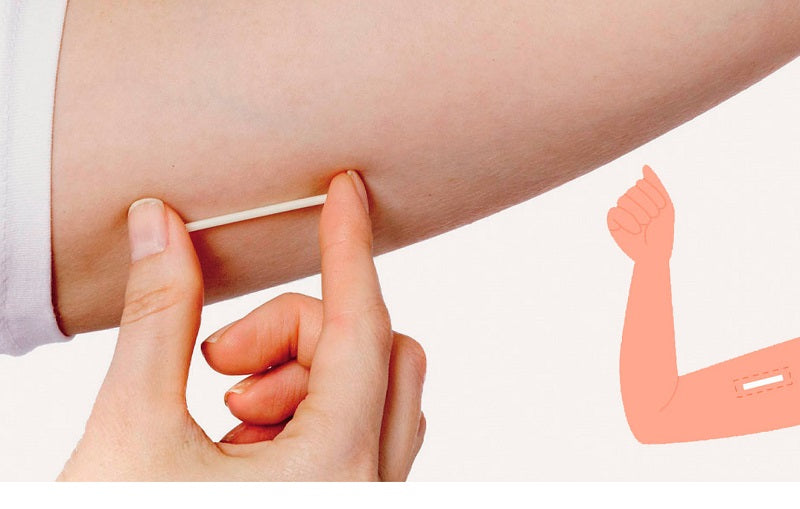The time it takes for a woman to menstruate again after having the Implanon implant varies from person to person. It’s dependent on what a woman’s health picture and hormonal balance looked like before getting the implant and also her state of health at the time of removal. Most importantly though, it’s important to understand the many things she can do and areas of health she can support to fast-track the process and restore her fertility.
What is the Implanon?
Implanon is a popular form of hormonal contraception. It’s a non-biodegradable matchstick-sized plastic rod that is inserted under the skin in the upper arm. Once inside the body, it releases the synthetic hormone drugs known as progestin and etonogestrel. These drugs trick the body into stopping ovulation (release of an egg) and therefore the possibility of pregnancy. They also cause thickening of the fluid around your cervix so that no sperm can enter. Implanon rods must be changed every three years.
Do you still bleed with the Implanon?
When a woman has an Implanon she may bleed, but she does not have a menstrual cycle. This is because menstrual bleeding occurs as a result of ovulation. Instead, any light bleeding or spotting that happens is because of hormonal fluctuations. There is also a 1 in 5 chance her period will stop entirely.
How long after Implanon removal will periods resume?
How long it takes to restore one's menstrual cycle varies from woman to woman. The literature states between 1-3 months but it’s not unusual to see 12 months pass before ovulation naturally occurs again. The following details factors which can influence this process:
- Pre-existing hormonal conditions. Many women use the implanon to manage hormonal conditions or symptoms and so once the implanon is removed, these issues (heavy bleeds, PCOS, anovulatory bleeds) return.
- Liver function. The liver is responsible for clearing out old unwanted hormones and an overburdened liver can lead to hormonal imbalance.
- Digestive health. Our gut is the home to the ‘oestrobolome’ which is a community of bugs that modulate and clear out oestrogens.
- Thyroid function. Low levels of thyroid hormone can interfere with the release of an egg from your ovary.
- Stress levels. High cortisol levels can suppress the surge of luteinizing hormone (LH) necessary for ovulation.
- Exercise (over-training). Exercising too much has been linked to anovulation.
- Nutrition (caloric intake). Being both underweight or overweight can negatively impact the communication between the brain and ovaries influencing ovulation.
- Herbal medicine support. Certain herbal medicines can modulate hormones and encourage healthy ovulation.
Tracking Your Period
Tracking your menstrual cycle is a great way to better understand your body, its signals, and whether you are ovulating or close to ovulation or not.
The Fertility Awareness Method (FAM) and Billings Ovulation Method are two well-researched, all-natural, and hormone-free methods worth exploring. They are alternatives to birth control that involve observing and interpreting physical signs and symptoms occurring in response to the changing hormone levels throughout your menstrual cycle. They can also be used to plan your intimate moments to optimize your chances of pregnancy if you’re hoping to conceive.
What will my first period look like after Implanon removal?
There may be some spotting or irregularity after removal as your endocrine system works to find balance once again. Thankfully there are ways to support this process and they include:
- Eating a diet rich in whole foods. Our FREE 8-week program is a wonderful guide.
- Adequate movement
- Daily bowel motions
- Having healthy hormone clearance
- Managing stress levels
- Herbal hormone-balancing medicines. Our free assessment can guide you.
We have a team of naturopaths who are available to provide you with personalized support if you experience ongoing irregularities or issues after removal. Connect with them for a free call here.
Get Expert Advice
As described above, the time it takes for a woman’s menstrual cycle to return after removal of the Implanon varies. However, there is a lot that can be done to support the transition back to regular monthly ovulation and fertility. Our period is like our monthly report card, so whether or not one hopes to become pregnant, healthy ovulation is important for overall health.
Consult with one of our naturopaths at Happy Healthy You to get expert advice when you need to have your Implanon removed. Just click on the button below for a free consultation.











Leave a comment
This site is protected by hCaptcha and the hCaptcha Privacy Policy and Terms of Service apply.